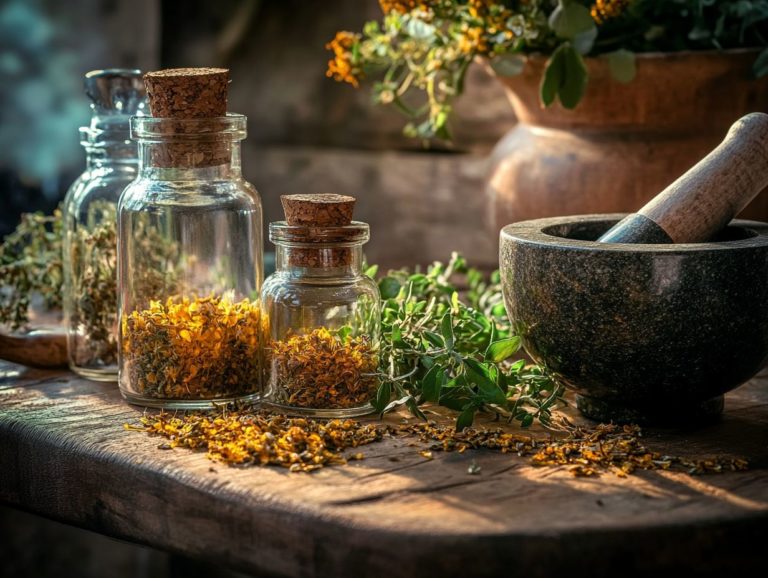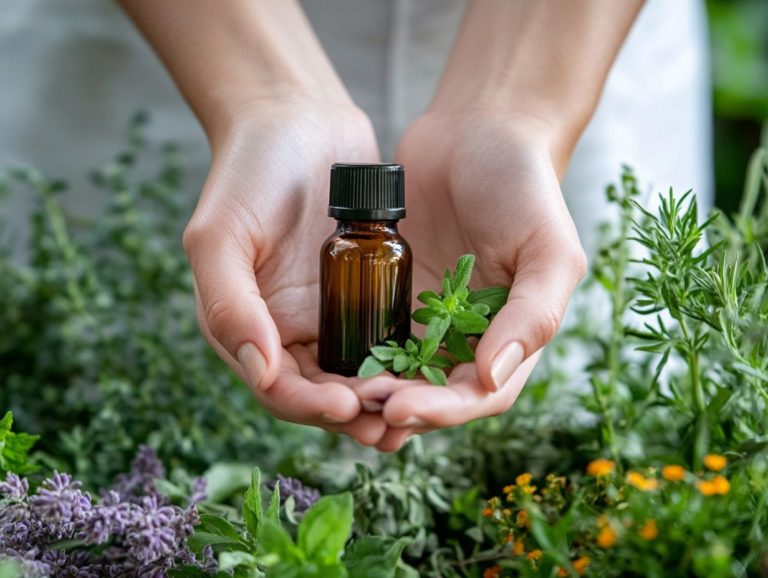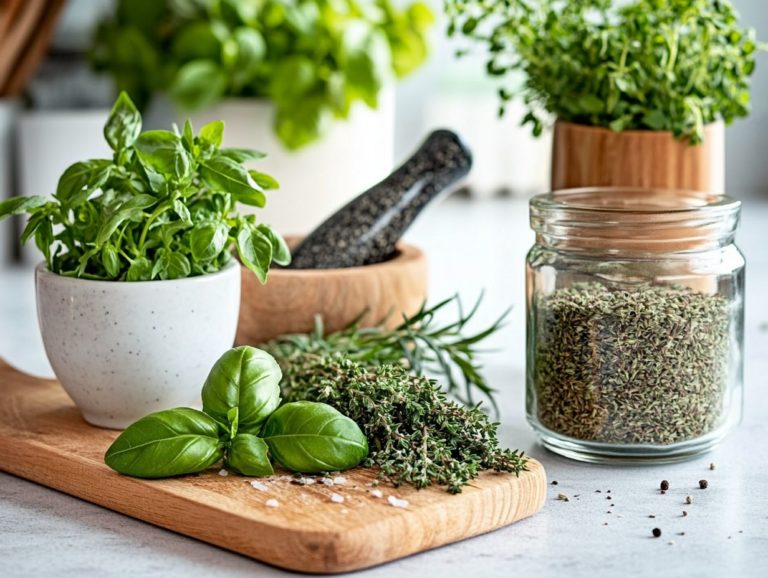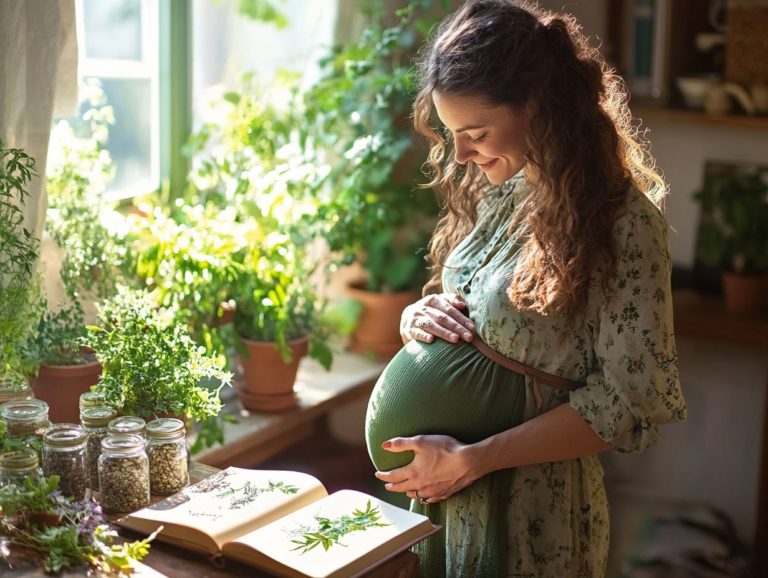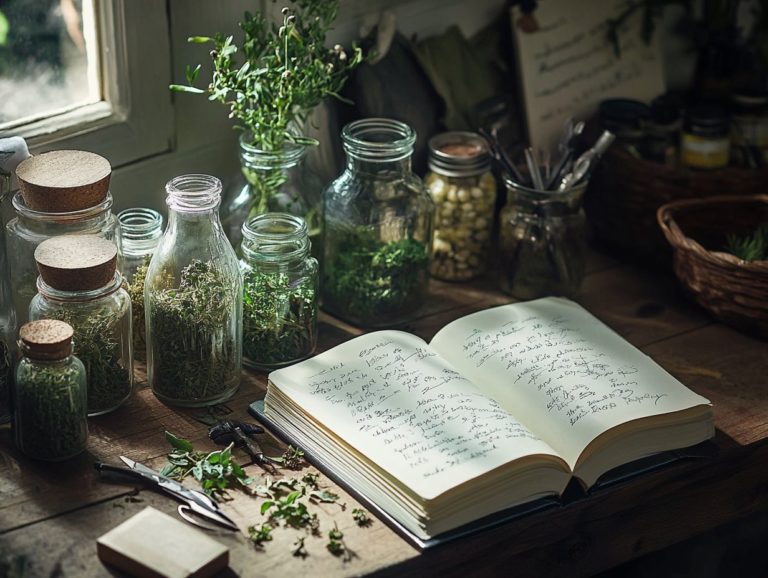What Is the Difference Between Tinctures and Teas?
Herbal preparations have been cherished for centuries, presenting a natural path to wellness. Among the most popular forms are tinctures and teas, each offering unique benefits and distinct methods of preparation.
This article delves into the essence of these herbal extracts, highlighting how tinctures deliver concentrated advantages while teas provide soothing infusions.
You ll gain insights into the differences in their preparation techniques, including preparing herbal tea and herbal tinctures. You will also receive guidance on selecting the right option to meet your health needs.
Explore the exciting world of herbal remedies and uncover what works best for you, whether it’s finding the right herbal preparations or learning about the benefits of herbal capsules and dietary supplements!
Contents
Key Takeaways:
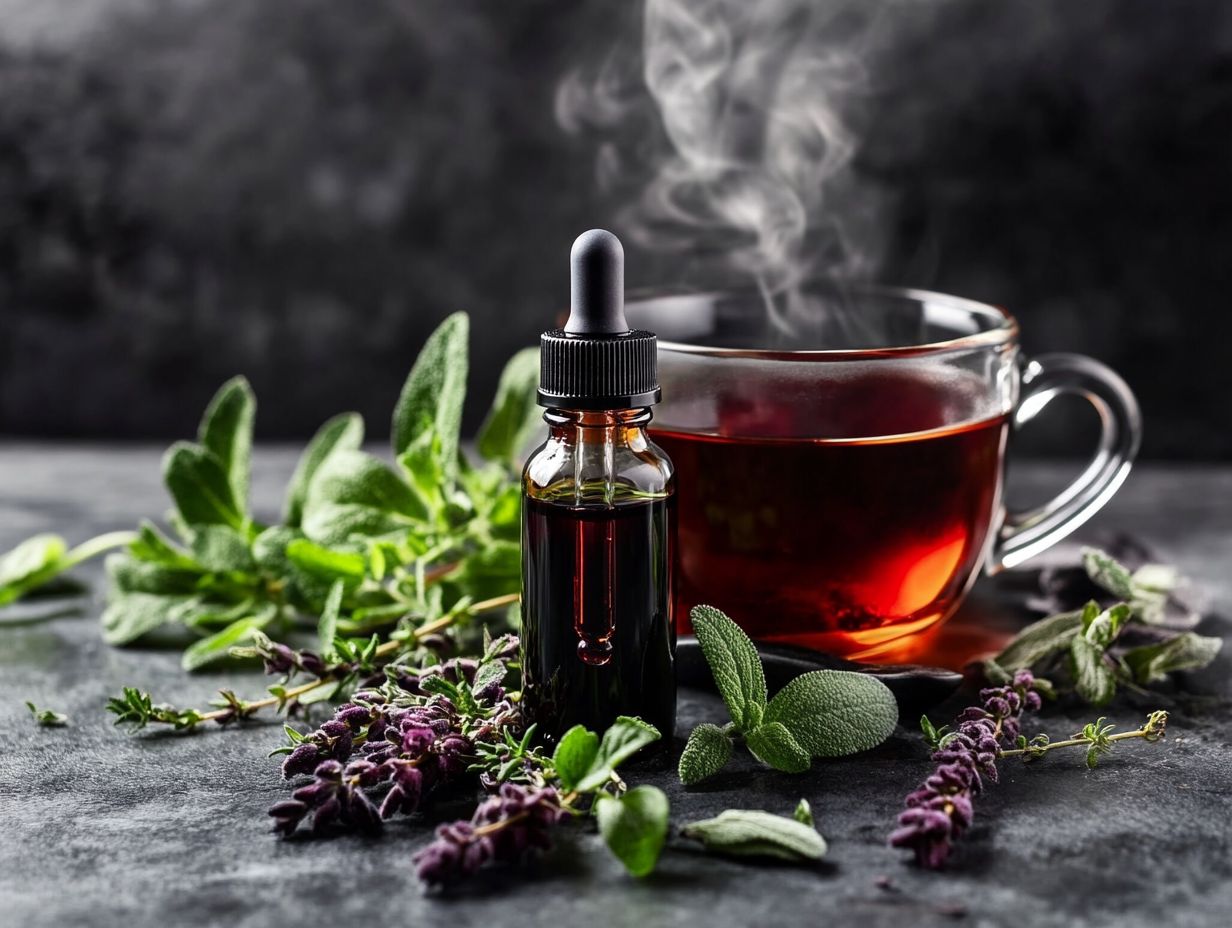
- Tinctures are concentrated herbal extracts that offer convenience and longer shelf life, making them ideal for medicinal purposes, especially for those dealing with blood sugar imbalances.
- Teas are infused herbal beverages that provide a more subtle and gentle effect, making them suitable for daily consumption and overall wellness.
- The key difference between tinctures and teas lies in their preparation methods and ingredients, with tinctures requiring alcohol and teas requiring hot water for extraction.
Understanding Herbal Preparations
Understanding herbal preparations means diving into a rich tapestry of natural healing methods, each offering its own distinct benefits and applications. This includes the use of bitter herbs and versatile preparations. Herbal remedies, such as herbal teas and tinctures, harness a variety of medicinal compounds extracted from plant matter.
By exploring these versatile preparations, you can truly appreciate their roles in promoting health and wellness. Whether it s calming your nerves with a soothing herbal tea or addressing more serious problems like blood sugar imbalances with powerful tinctures made from roots and leaves.
For many, these affordable herbs have become essential to their health regimen, guided by the expertise of herbalists like Laurel Vukovic and herbal medicine makers who share their knowledge within the vibrant herbal community.
Overview of Tinctures and Teas
Herbal tinctures and teas rank among the most sought-after herbal preparations, each presenting distinct ways to extract herbal properties and consume them. Tinctures, typically crafted from alcohol extracts of roots and leaves, deliver concentrated medicinal potency, allowing you to take higher dosages for quick-acting benefits and relief.
In contrast, herbal teas are generally made by infusing or decocting dried herbs in fresh water. This transforms the experience into a soothing ritual that many find calming after dinner, perfect for fostering relaxation.
Tinctures offer a longer shelf life and convenient dosing. Teas possess their own allure, providing a gentle pathway to wellness ideal for those who prefer a more relaxed approach to their herbal remedies.
Common herbs used in tincture preparation include:
- Valerian root for calming,
- Echinacea to boost immune function,
- Peppermint for digestive support.
Conversely, teas often feature:
- Chamomile for its soothing effects,
- Ginger to alleviate nausea,
- Hibiscus for cardiovascular benefits.
By grasping the unique advantages of each preparation, you can tailor your herbal routine to align perfectly with your health needs and personal preferences.
Benefits and Uses of Tinctures
Herbal tinctures present a wealth of health benefits, acting as concentrated extracts that tap into the powerful medicinal compounds of various herbs. They are ideal for treating conditions like acute inflammation and regulating blood sugar levels.
These quick-acting remedies are particularly effective for tackling acute inflammation and regulating blood sugar levels. Their versatility makes tinctures a go-to choice for herbalists and health enthusiasts, offering a seamless way to weave herbal remedies into your daily wellness routine.
Concentrated Herbal Extracts
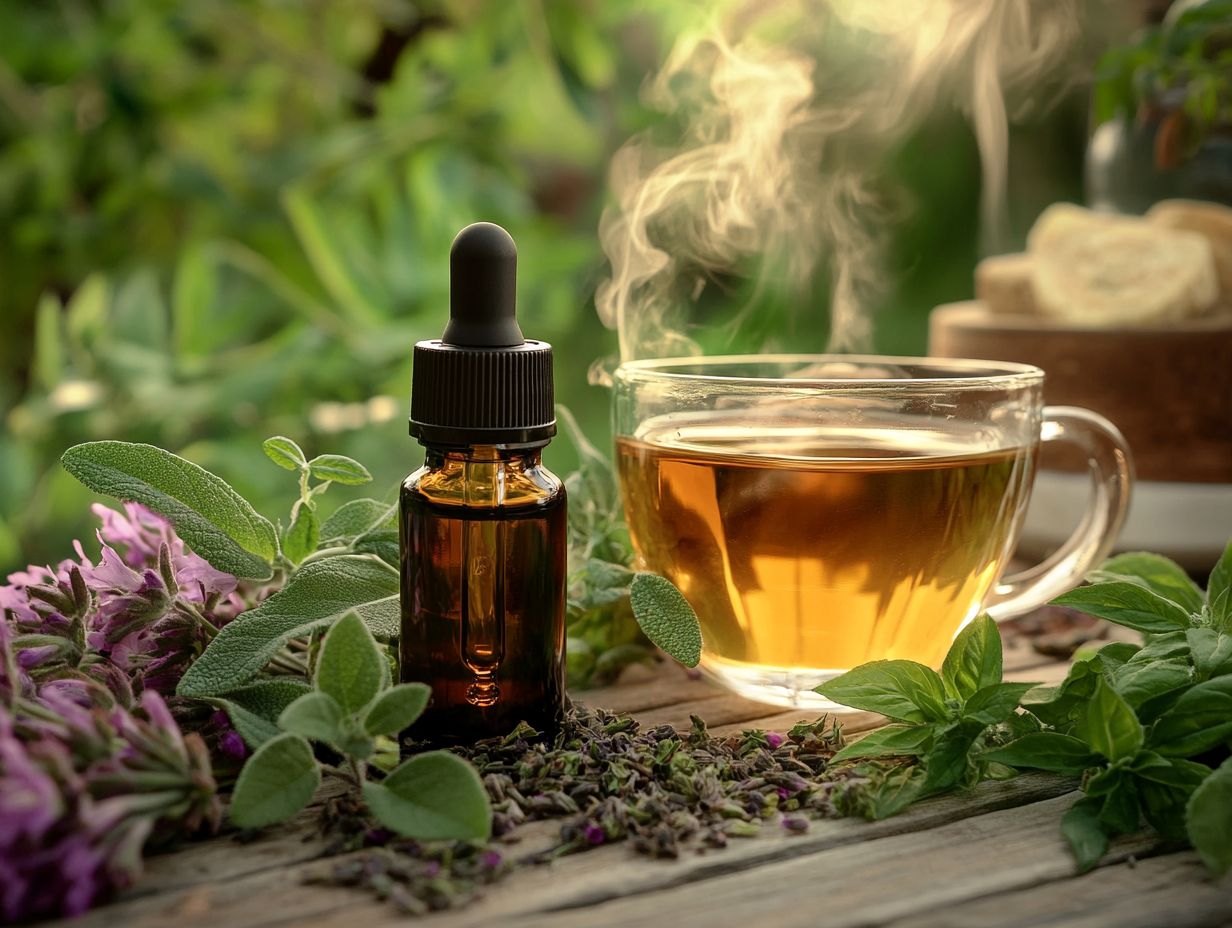
Concentrated herbal extracts, primarily found in tinctures, are carefully made through various extraction methods. These methods are designed to maximize the medicinal strengths of the herbs and enhance their healing abilities.
Skilled herbalists use these techniques to ensure the beneficial properties of the plants are transformed into a potent liquid form. This makes it easy for you to consume and increases the efficacy of your herbal preparations.
One common technique is alcohol extraction. This method uses strong alcohol to pull out essential oils, alkaloids, and flavonoids from the plant material, capturing their medicinal qualities. This method works well for herbs like echinacea, known for its immune-boosting properties, and for bitter roots like myrrh.
On the other hand, water extraction is often used to create infusions and decoctions. This method employs hot or cold water to draw out water-soluble compounds, allowing for strong infusions that benefit many herbs.
This technique is frequently used with herbs such as chamomile, celebrated for its soothing effects, and stinging nettle, which offers additional health benefits.
Herbalists must carefully consider concentration levels during preparation. This is particularly important when crafting tinctures or preparing strong herbal teas.
Higher concentrations can yield more potent effects. This allows herbalists to tailor remedies to your individual needs while preserving the integrity of valuable medicinal qualities found in plants.
Benefits and Uses of Teas
Herbal teas are celebrated for their extensive health benefits. They serve as a delightful after-dinner beverage that can soothe your nerves and foster relaxation.
Preparing herbal tea through infusion extracts the medicinal properties from dried herbs. This provides a straightforward yet effective means to tackle various concerns through natural healing, including digestive issues and overall wellness.
Infused Herbal Beverages
Infused herbal beverages, especially in the delightful form of herbal teas, are your go-to for a soothing experience. They enhance your daily wellness routine.
By steeping dried herbs in hot water, you allow the medicinal compounds to seep into the liquid, releasing their powerful health benefits. This preparation method transforms your tea time into a calming ritual.
Various techniques, like infusion and decoction, have unique benefits tailored to the type of herbs you choose. Infusions are perfect for delicate herbs like chamomile or mint, where a brief steeping unlocks their flavors and health benefits.
This makes them ideal for soothing nerves. In contrast, when working with tougher herbs like roots and barks, decoction is your best friend it requires a simmer to fully release those potent compounds.
Don t underestimate the power of high-quality dried herbs. They play a pivotal role in elevating both the flavor and therapeutic effects of your brews.
Choosing superior ingredients ensures that each cup you sip delights your palate and nurtures your overall wellness. This enhances the benefits of your herbal preparations.
How Tinctures and Teas Differ in Preparation
Tinctures and herbal teas stand apart in their preparation methods. Each presents distinct ways to draw out the beneficial compounds of herbs.
Tinctures typically use alcohol extracts to create concentrated herbal solutions. In contrast, herbal teas embrace water-based techniques that facilitate a gentle infusion of the plant’s medicinal properties.
Understanding these differences is essential for anyone eager to effectively utilize the strength of herbal medicine.
Methods and Ingredients
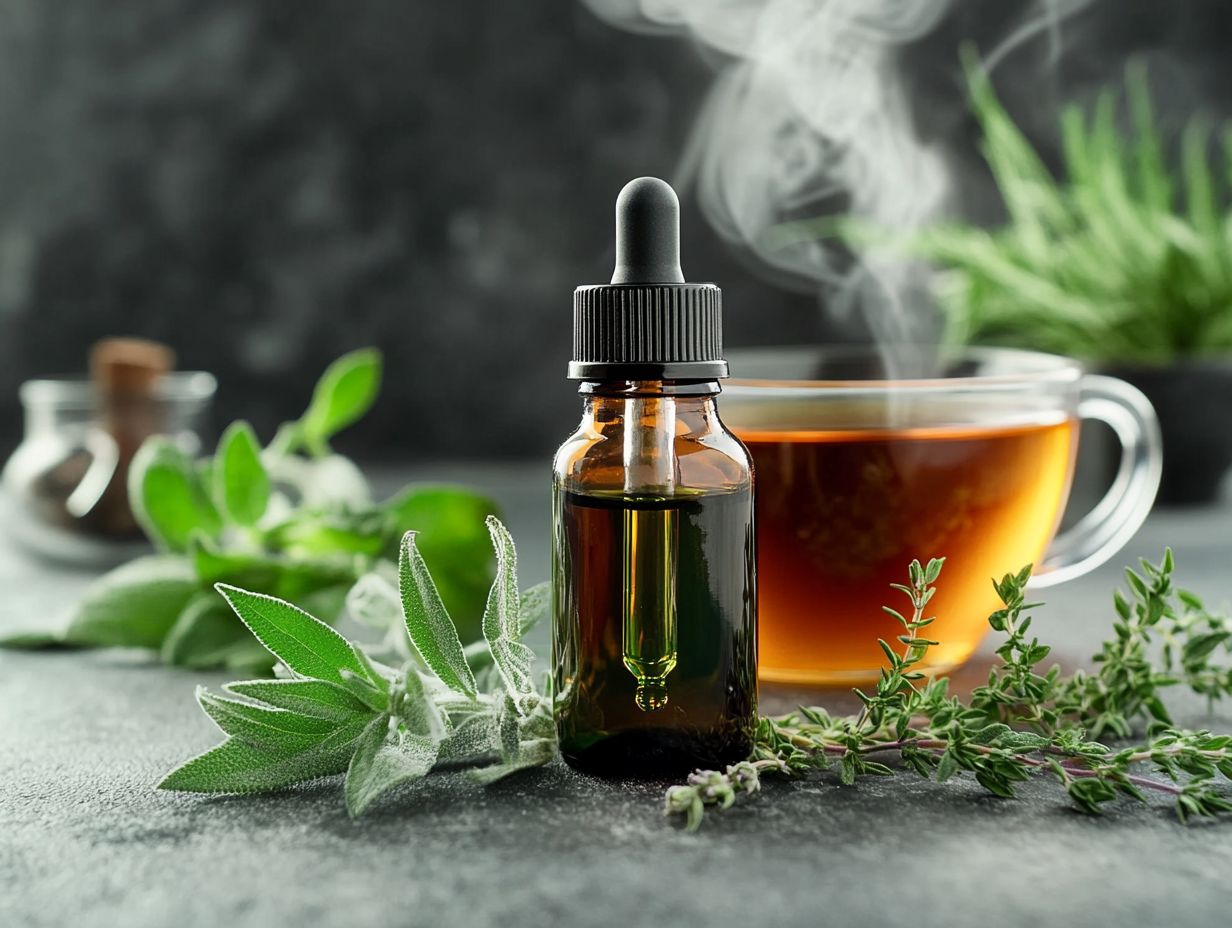
The methods and ingredients you choose for preparing herbal teas and tinctures are crucial in affecting how well they work and taste. In terms of herbal teas, using fresh water and high-quality dried herbs is essential for crafting a flavorful and beneficial infusion. This ensures that you enjoy the full spectrum of medicinal compounds.
Tinctures require specific ingredients and techniques to ensure that the active compounds (the ingredients that provide health benefits) are efficiently extracted while maintaining the integrity of the herbs.
By selecting herbs that align with your desired health benefits, such as ginger for its anti-inflammatory properties or chamomile for its calming effects, you can supercharge your wellness routine! For example, chamomile and peppermint are prized for their calming effects. Meanwhile, ginger and turmeric are often sought after for their anti-inflammatory properties, making them popular among health enthusiasts.
The quality of your water plays a significant role. Opting for filtered or spring water enhances the extraction process, ensuring that you capture the full spectrum of flavors and medicinal properties for optimal tea. Different methods, such as cold infusions or boiling, can influence the extraction rate of active compounds, vital for creating potent tinctures or strong infusions.
Understanding these nuances allows you to prepare more effectively and maximize the potential health benefits of your herbal preparations, especially when considering factors like personal preference and versatility of use.
Choosing Between Tinctures and Teas
When it comes to choosing between tinctures and herbal teas, it s a decision that often hinges on your personal preferences and specific health needs, including considerations of medicinal qualities and dietary supplements.
Seeking quick results? Tinctures deliver concentrated dosages and fast-acting benefits, making them a powerful option for those needing quick relief, especially for acute inflammation or blood sugar imbalances. On the other hand, herbal teas offer a gentler, more soothing experience that can seamlessly fit into your daily routine, especially as a comforting after-dinner drink.
By understanding the factors influencing this choice, including the methods of extraction and the expertise of herbalists, you can optimize your use of these herbal preparations and ensure you reap the maximum health benefits tailored to your lifestyle.
Factors to Consider
When weighing the choice between tinctures and herbal teas, several factors deserve your attention: personal preference, health benefits, and versatility of use. Each preparation type boasts unique advantages tailored to diverse needs and lifestyles, making it crucial for you to assess what aligns best with your individual wellness goals.
For instance, tinctures are highly concentrated, allowing for quick absorption. They often require only a few drops to deliver their effects, which can be particularly appealing if you’re seeking immediate relief or support. On the flip side, herbal teas offer a comforting ritual; they not only hydrate but also provide a delightful pause amid a hectic day.
You may notice that the taste of certain herbs can be a bit off-putting. However, tinctures come with the benefit of being flavorless or easily masked by other ingredients. Many herbalists recommend exploring both methods. For a deeper understanding, check out the differences between herbal infusions and herbal teas. One respected expert highlights how a blend of tinctures and teas can cater to varying moods and needs, ensuring a holistic approach to wellness that resonates with your personal preferences.
Frequently Asked Questions
What Is the Difference Between Tinctures and Teas?
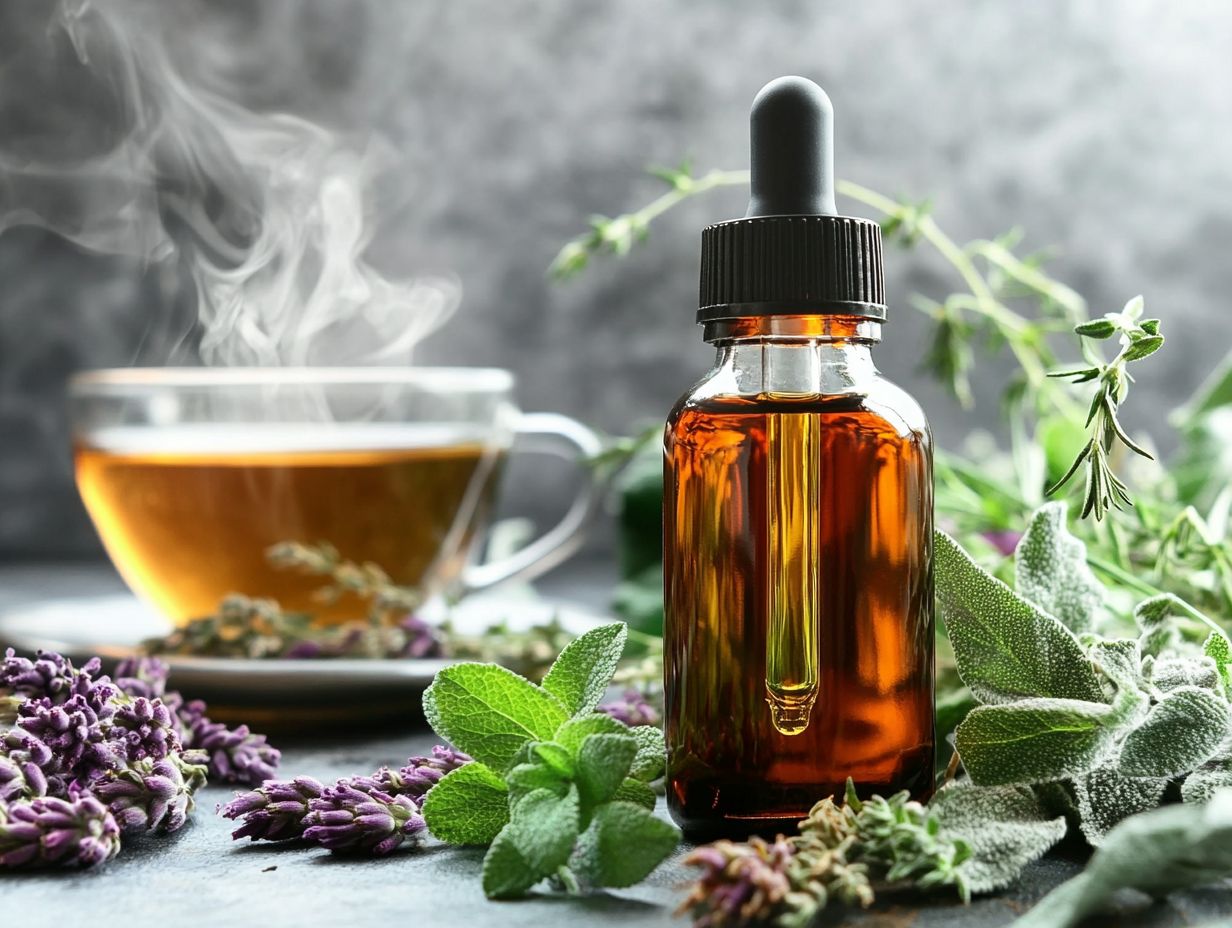
Tinctures and teas are two common herbal preparations, but they are quite different in terms of their ingredients, method of preparation, and effects on the body.
Curious about Tinctures?
Tinctures are concentrated liquid extracts made from herbs and alcohol. The alcohol acts as a solvent, extracting the active compounds from the herbs.
What are Teas?
Teas, or herbal infusions, are made by soaking herbs in hot water. This process allows the herbs to share their healing benefits with you.
How do Tinctures and Teas Differ in Ingredients?
Tinctures usually come from one herb or a mix. Teas, on the other hand, can include a variety of herbs, spices, and even fruits.
What are the Benefits of Tinctures?
Tinctures are concentrated. They provide a quick and effective way to take herbal medicine, plus they last longer than teas.
What are the Benefits of Teas?
Discover how teas can gently introduce powerful herbs into your body! You can customize them by blending different herbs to tackle specific health concerns.
Start exploring how these herbal solutions can elevate your health today!

